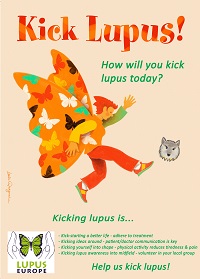Let's Kick Lupus Out!
 ©LupusEurope
©LupusEurope
The World Lupus Day is celebrated every year on the 10th of May. We take the opportunity to share the call from our member Lupus Europe for more awareness and treatment opportunities. On our blog, you will read the incredible story of Sophie, a UK patient, helping school personnel to get to know the disease.
What is lupus?
Lupus is a chronic autoimmune disease that causes the immune system to attack the body’s connective tissue and organs. Parts of the body affected can include the joints, kidneys, heart, lungs, brain, blood and skin.
Up to 500,000 people in Europe have lupus. 90% of people with lupus are women and 80% of diagnoses are made between the ages of 15 and 45.
Symptoms can vary. The less severe ones include rashes, hair loss (alopecia), swollen glands, photosensitivity, joint pain and ulcers in the mouth or nose. In more severe cases, lupus may cause pleurisy, pericarditis, psychosis, meningitis, epilepsy or kidney failure. In young women, lupus can cause miscarriage or premature delivery.
If lupus affects vital organs and is left untreated it can be potentially fatal as it may cause organ damage and failure. Fortunately, in most cases, treatment puts lupus into remission before that can happen.
No Cure Yet!
Great progress has been made developing treatment plans that considerably reduce lupus activity for most patients, however there is no cure yet! Typical treatment may include antimalarials (hydroxychloroquine), steroids (prednisolone), non-steroidal anti-inflammatories, and immuno-suppressants. Many patients do well on current medication but patients with more severe forms of lupus need more treatment options and solutions which reduce the current reliance on cortisone and its many long term side-effects. A complete treatment plan should also include physical exercise which is proven to have positive effects on fatigue, pain and mental health.
For most patients, living a full life with lupus is now possible, thanks to increasingly accepted standards of care, but this relies on early diagnosis, consistent treatment prescribed by a lupus specialist, and adherence to medication. Getting back to an active professional life may present a challenge for some but many people are able to return once their lupus is well controlled. Most women who want to start a family will also be able to if they plan their pregnancy carefully, with specialist supervision.
********
LUPUS EUROPE is an umbrella organisation that federates national lupus groups across Europe. It represents 26 groups (between 15-6,000 members), in 24 countries (33,000 people in all). It was first formed in 2000 (formerly known as ELEF).
LUPUS EUROPE’s activities include raising awareness, sharing information between members and countries, empowering national groups, and helping members participate in and benefit from research. Over the years, LUPUS EUROPE has fought hard for patient-centred care and the inclusion of patient organisations as a valued healthcare stakeholders.
********
The Kick Lupus campaign - Why ‘Kick Lupus’?
Kick Lupus!
The campaign ‘Kick Lupus!’ focuses on the need for the development of better treatments, increased awareness about the disease's impact, and management options for patients, carers and health professionals.
Help us Kick lupus NOW! Take your first steps today. You can find the list of local member groups on the LUPUS EUROPE Website (www.lupus-europe.org).

